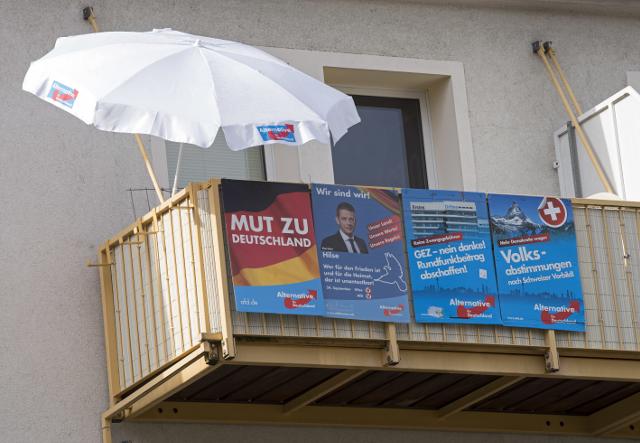"Germany shows the cultural forces driving populism"
Monday, 02.10.2017.
11:50

"Germany shows the cultural forces driving populism"
To those premature pundits who assured us that the global populist wave was already receding, Germany has just delivered an enormous raspberry. In one of the most prosperous countries in the world, with the strongest possible taboo on xenophobic, right-wing nationalism (A. Hitler) and an existential commitment to European integration, one out of every eight voters has turned to a xenophobic, Eurosceptic, right-wing populist party, the Alternative for Germany (AfD).One lesson to be learned if this: if we are to combat populism, we must understand that its deep driving forces are as much cultural as economic.
Of course there's an economic component, even in Germany. Not all Germans are driving around in BMWs and contemplating their second holiday on Majorca. Yet the economic motive is much less salient than it was in the votes for Donald Trump and Brexit. In a poll conducted for the first German television channel (ARD), 95% of AfD voters cited threats to 'the German language and culture'.
As always, there are specific national causes. In this case, the two largest centrist parties, Social Democrats and Christian Democrats, have been in a 'grand coalition' government for eight of the last 12 years. That has propelled disgruntled voters to the smaller parties and the extremes. Unlike the leaders of some other centre-right parties, who have tacked to the right to pick up the populist votes, Angela Merkel has stayed with both feet planted firmly in the moderate, civilised, genuinely liberal centre. I have praised her for it in the past, and I do so again now. But her centrist, even slightly left-leaning moderation had a price. The Bavarian CSU, in particular, the more conservative sister party to Merkel's CDU, now loudly bemoans that 'open right flank'.
Then there is the east-west divide, with strong support for right-wing, xenophobic populism in many parts of the former East Germany. There is an almost perfect symmetry here: the areas which gave the most votes for the AfD, in the east, actually have the fewest immigrants. The East German phenomenon undoubtedly has much to do with the legacy of 40 years under a communist regime (a kind of political-psychological PTSD, if you will), and the way in which the two unequal halves of a once divided Germany have interacted since unification.
Yet rather clear geographical divides are also characteristic of other right-wing populisms: the Trump-supporting interior of the United States, against the more liberal coasts; Brexit-supporting England-without-London against cosmopolitan London and pro-European Scotland; Law and Justice party(PiS) rural, small town, eastern and south-eastern Poland against more liberal big cities, west and north west. For all the differences between these populist-voting regions, one finds in them a common feeling, a shared resentment, something like 'we exist too, but you have been ignoring us, treating us as second-class parts of the country'.
The same is true of the social dimension. We focus too much on the strictly economic aspect of inequality, as measured by the Gini coefficient. This certainly plays an important part in countries like America and Britain, where globalisation in a particular, neoliberal, financial-capitalist form has resulted in the top percentiles being disproportionately engorged with riches, while for the bottom half of society real wages and household incomes have stagnated or declined. With growing socio-economic inequality has come a further decline in equality of opportunity. But this is not the characteristic pathology of populism in Germany or Poland.
I believe we need to think more about more subtle, less easily measurable dimensions of inequality. I would call them inequality of attention and inequality of respect. Attention, as Tim Wu points out in his book The Attention Merchants, is one of the major currencies of our internet age. Now how much attention did our mainstream liberal media give, until recently, to the 'left behind' regions and social groups? How many knowledgeable, sympathetic reportages about the rustbelt did you read in the New York Times or about post-industrial England in the Guardian? Until, that is, the populist shock launched a thousand metropolitan reporters on their intrepid safaris to darkest Michigan or County Durham.
In Arthur Miller's Death of a Salesman, Linda, the wife of poor, struggling Willy Loman, cries 'he’s a human being, and a terrible thing is happening to him. So attention must be paid. He’s not to be allowed to fall into his grave like an old dog. Attention, attention must finally be paid to such a person.'
Inequality of attention shades into inequality of respect. A phrase that has become almost proverbial on the Polish populist right is 'redistribution of prestige'. It's an odd phrase, at first hearing, but actually it captures something important. Redistribution is not just about money; it's also about respect. Our societies have simply not delivered well enough on one of liberalism's central promises, summarised by the legal philosopher Ronald Dworkin as 'equal respect and concern' for each individual member of the society. At the end of Alexander Payne's lovely film Nebraska, the son of a battered, weary old white working class man buys his Dad a gleaming pickup truck. The old man drives slowly down the main street of the town where he grew up, enjoying, just for once, the admiring glances of his childhood companions. Attention. Respect.
This in turn shades into the cultural dimension – so important in Germany, but not only there. 'I don't recognise my country any more' is the characteristic sentence of the right-wing populist voter. 'On est chez nous' was the revealing chant of the supporters of French Front National leader Marine Le Pen. Immigration is obviously a key element here, especially when it comes linked to a real or imagined threat from Islam. In one recent Polish opinion poll, 42% of those asked said that Islamic terrorism was a major threat to Poland's national security, despite the fact that the country has virtually no Muslims and has refused to take even its minimal EU quota of refugees from the Middle East.
But it's not just immigration. It's also issues like abortion and gay marriage – and what is denounced as Political Correctness, meaning something like 'there are so many old-fashioned things I'm not allowed to say any more'. Then the ranting Trump, Le Pen or AfD leader comes along and the voter exclaims 'at last someone is telling it as it is!' And they complain that every other ethnic, religious and cultural group seems to be encouraged to have its identity politics – all except the native, 'true' English, Americans, Poles or Germans, who feel embattled and ignored. Populism is their identity politics.
This is not the whole story of course. In Europe, hostility to the EU, and specifically to the euro, is a major driver of populism. The AfD started life as an anti-euro party. But these social and cultural dimensions are common to most populisms, both in Europe and beyond. So let's listen to Linda Loman and pay attention. If we make the wrong diagnosis, we will never find the cure.
Timothy Garton Ash is Professor of European Studies at Oxford University, where he leads the freespeechdebate.com project, and a Senior Fellow at the Hoover Institution, Stanford University. His latest book is Free Speech: Ten Principles for a Connected World. He was recently honoured with this year's International Charlemagne Prize




























































Komentari 6
Pogledaj komentare